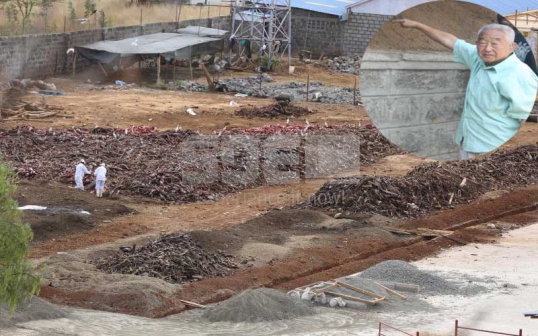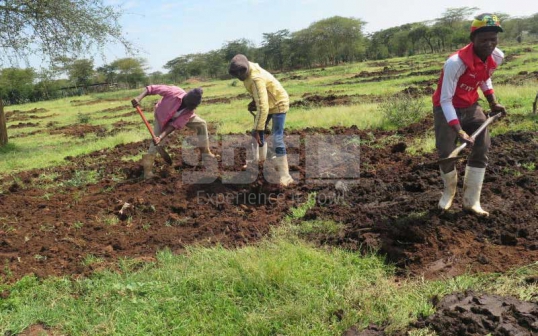
What was supposed to be the gateway to the scenic beauty of the Rift Valley, with all its lakes and other attractions, is under threat from stench coming from a Chinese-run donkey slaughterhouse.
The smoke and the stench due to poor disposal of waste is what welcomes users of the Nakuru-Marigat highway.
The situation is worse during rainy days at the crucial Equator line crossing. This is because of disposal of waste such as foetuses and even tripe and its murky contents in the open ground that was supposed to be the owner’s breeding ground.
Not far away, in the same Chemogoch village, is the main Goldox donkey abattoir, where another wave of stench swirls around homes. This is causing serious environmental and health concerns both for man and livestock.
And it is not just the air they breathe that is polluted; the water too is affected as rain drains the murk into collection points such as pans that the local communities use.

So bad is the problem of waste disposal that for one to cross the section where the factory is built, one has to hold their nose. You must also roll up the windows, if you are in a closed car, to keep off the cloud of smoke from incinerators.
Villagers are now questioning how the factory was cleared, both by the previous Baringo County government and the National Environment and Management Authority, as far as increased cases of poor disposal of waste by Goldox, run by Mr Lu Donglin, is concerned.
Mr Dunglin has in the past received court summonses over the stink his factory has raised in the county.
The slaughter house has been riddled with waste-disposal challenges since it started operations earlier last year.
Impact assessment
Lack of proper environmental impact assessment and laxity in enforcement of disposal laws, the locals argue, has continued to affect them.
“We stopped using water from the boreholes because waste from the abattoir is carelessly disposed of in the open field, which in turn leaks into the soil, contaminating underground water,” said Mr Kipketer Changwony, a resident.
The slaughterhouse admitted to having no dumping site and has since been disposing of waste in a field the company had set aside for breeding of donkeys.
“If extensive environmental impact assessment was done, then the company should have a proper disposal unit. However, they have turned this ground into a dumping site. Worse still, the abattoir waste is strewn all over,” Mr Kipketer said.
The abattoir slaughtered 7,360 donkeys in June, translating to 450 donkeys daily, according to records seen by The Standard. However, the residents said the situation was appalling given that the company slaughters a high number of donkeys without proper disposal.
The residents claimed to have forwarded their complaints to the company several times but they had been ignored. Not much help has come from the local public health officials because their efforts to deal with the problem are sabotaged by highly placed officials with close relations with the proprietor.
“As much as the company is employing a number of youths, they also should mind the health of the community. We are at risk of contracting zoonotic (animal to man) diseases,” Mr James Murei said, adding that the site has given room for breeding of dangerous stray dogs that feed on the waste.
Sourcing water from the river, Mr Murei said, does not help much since the waste is always swept downstream, adding that the company just started burying the waste after the uproar.
“They started burying the waste yesterday when we threatened to report it to relevant authorities,” Murei said.
Dumping site
According to an official from the company, Silas Chesebe, the firm is yet to locate a dumping site for its waste. “This is just a temporary site since this is our breeding ground. The company is working on securing a place as well as employing mechanisms of disposing the waste,” Mr Chesebe said.
He admitted that Nema is not aware of the company is disposing waste on their breeding ground since this was a temporary measure.
George Ogolla, also an official with the company, curiously explained that the waste being disposed on the field was part of the organic manure from the company.
“These are some of the dried waste. We normally dispose them on the open field so that the neighbouring community can also benefit from them by using them on their farms. We however do not sell them,” Mr Ogolla said.
However questions rise on how a company can admit disposing bloody meat tissues, foetuses and even bones in the open, leading to disturbing stench all around.
Mogotio public health officer Francis Cheruiyot said much had not been achieved. “Our hands are tied now that the case is in court. The company keeps asking for more time but does not keep its promises,” Mr Cheruiyot lamented.
 The Standard Group Plc is a multi-media organization with investments in media
platforms spanning newspaper print
operations, television, radio broadcasting, digital and online services. The
Standard Group is recognized as a
leading multi-media house in Kenya with a key influence in matters of national and
international interest.
The Standard Group Plc is a multi-media organization with investments in media
platforms spanning newspaper print
operations, television, radio broadcasting, digital and online services. The
Standard Group is recognized as a
leading multi-media house in Kenya with a key influence in matters of national and
international interest.
